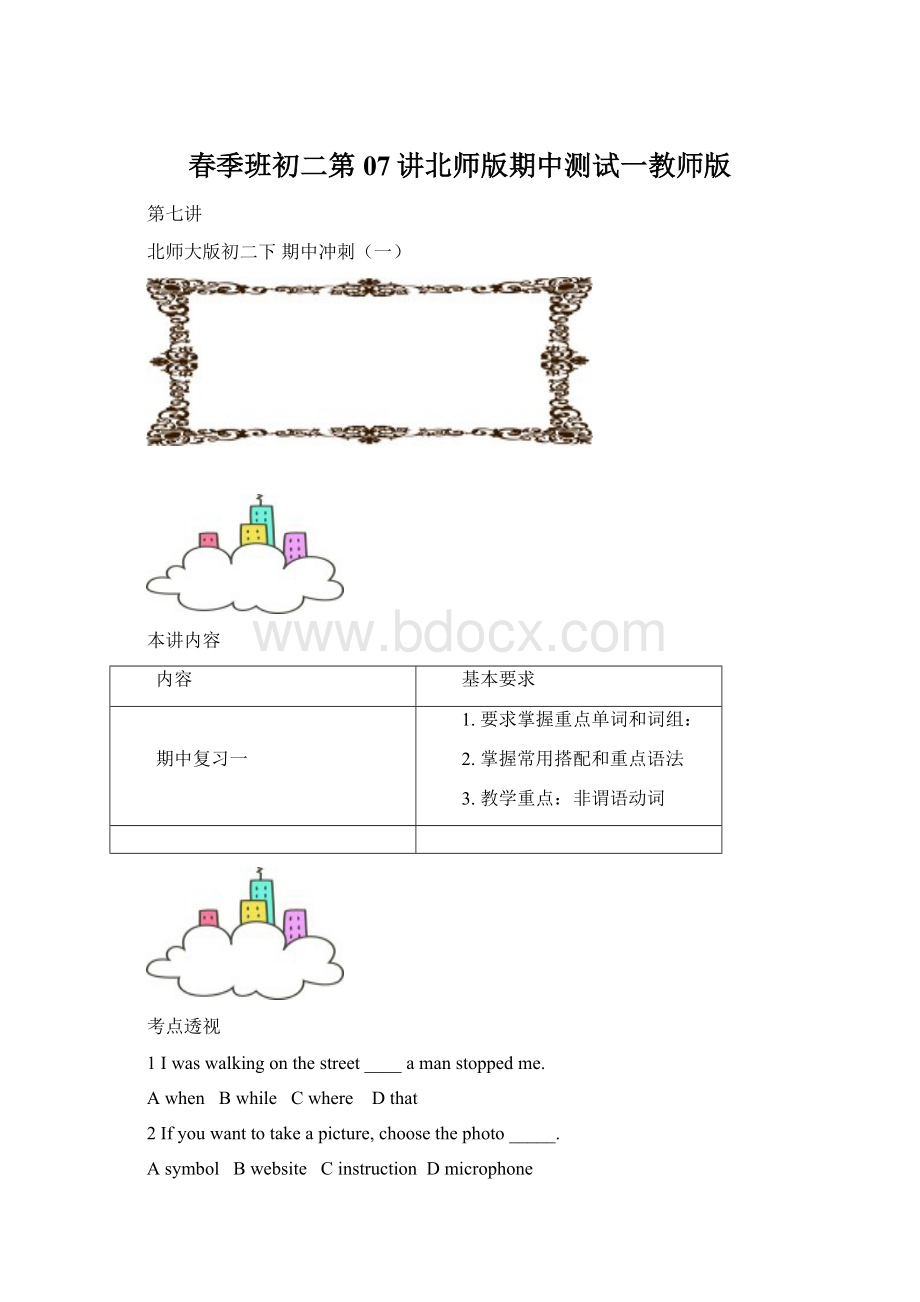 春季班初二第07讲北师版期中测试一教师版Word下载.docx
春季班初二第07讲北师版期中测试一教师版Word下载.docx
- 文档编号:21082756
- 上传时间:2023-01-27
- 格式:DOCX
- 页数:31
- 大小:793.48KB
春季班初二第07讲北师版期中测试一教师版Word下载.docx
《春季班初二第07讲北师版期中测试一教师版Word下载.docx》由会员分享,可在线阅读,更多相关《春季班初二第07讲北师版期中测试一教师版Word下载.docx(31页珍藏版)》请在冰豆网上搜索。

AturndownBturnupCturnoffDturnon
12---Couldyoutellme____?
---Pardon?
Youmeanthepolicestation?
AwhereisthepolicestationBwherethepoliceare
ChowcanIgettothepolicestationDwhereisthepoliceman
13Ipressthe‘camera’key,____thecellphonedoesn’twork.
AandBbutCsoDbecause
14I’msorryIforgot_____youthenews.Butit’sallrighttohearitagain,isn’tit?
AtotellBtellingCtellDtold
15Ioftenlistenedtohim_______thepiano.
AtoplayBplayCplayingDplayed
16Weshouldtakecareofthem_____wekeeppets.
AhowBifCwhereDwhy
17---Ithinkwe’llgotoplanttreesnextweek.
---Terrific!
Plantingtreesisalotoffun.I’dliketo___you.
AvisitBjoinCfollowDmeet
18Shedidn’tremember___shereturnedthatbooktothelibrary.
AwhetherBthatCwhereDwhat
19Tryto_______sometimealonetalkingwithyourgoodfriends.
AtakeBspendCcostDpay
20Imissmygrandparentsverymuch,soI’llvisitthem_____nextmonth.
AsometimesBsometimeCsometimesDsometime
21---Oh,Ican’twalkanymore.
---Mygod,whathappened_______you?
AatBtoConDwith
22Noonetellsus___,soweneedyourhelp.
AhowshouldwedoBwhatshouldwedo
ChowtodoitDwhattodoit
Keys:
1~5
AADCD
6~10
A
DDDB11-15ABBAB16-20BBABB21-22BC
同步串讲
Step1知识点梳理
【重点词汇短语】
1.crossv.表示“穿过,越过,渡过”,强调动作。
acrossprep.表示“横过,穿过”,强调从物体表面的一边到另一边,往往与动词连用,常指穿过一条路,一条河,一座桥等。
e.g.Crosstheroadwhentheredlighton.
TonyisexpectingtoswimacrosstheAtlantic.
【拓展】throughprep.穿过
e.g.Lastnight,Isawazombiewalkthroughtheforestwithaplantinitshand.
2.makeachoicechoicen.选择v.choose
e.g.IhavetomakeachoicewhethertostayontheearthorgobacktotheMars.
3.afford支付的起
e.g.---Honey,Ican’taffordthehouse.
---Oh,well,Ihavetofindtheonewhocanaffordit.
【拓展】offer提供,主动提出
e.g.---Hi,everybody!
Ihavefoundtheonewhoofferstolendmetenmilliondollars.
4.picksth.up把……东西捡起来picksb.up顺便接某人
e.g.Neverpickupwhatotherssay.永远不要拾人牙慧。
Iwillpickupmylittlesisterfromherkindergarten.
5.falloff:
______/falldown:
________
e.g.Shopliftershavefallenoffbecauseoftheseriouspunishmentinthatsupermarket.
Ihearsomeonefalldownfromthestairs.
Thehousepricewillfalldown.
6.trytodosth.vs.trydoingsth
seesb.dosth.vs.seesb.doingsth
stoptodosth.vs.stopdoingsth
7.beawareof
e.g.Johnhasbeenawareofhavingdonesomethingwrong.
Iamawareofwhathesaidwrong.
8.obeyv.
e.g.trafficlaws/orders/mands/imperialdecree
Obeyyourthirst!
Theyobeytheirparents.
9.giveup放弃
e.g.I’llnevergiveupdrinkingandsmoking.
【give短语总结】
givesb.acall
giveatalk
giveback
givesomeadvice
givesb.achace
giveamessageto
giveout
giveaway
giveoff
giveahand
givein
10.healthn.健康,卫生
●Wishyougoodhealth.
祝你健康。
●Healthismuchmoreimportantthanmoney.
健康比金钱更重要。
【点拨】beingoodhealth身体好。
如:
Heisalwaysingood(poor,bad)health.他的身体一直很好。
11.healthy健康的,健壮的。
●She'
saveryhealthychild.
她是个非常健康的孩子。
【点拨】该词为不可数名词,是health的形容词形式。
keepsb.healthy=keepsb.ingoodhealth使某人保持良好的身体状态。
Helooksveryhealthy.他看起来很健壮。
12.was是(过去的)
●Whenhewasachild,helikedtoaskquestions.
当他是孩子的时候,他很喜欢问问题。
【点拨】was是am,is的过去时,were是are的过去时。
MyfatherandmotherweregooddoctorsinAmerica.在美国我父亲和母亲是个好医生。
13.ill病的
●Sheisill,soshecan'
tetoschooltoday.她病了,所以她今天不能来学校。
【点拨】该词常用表语,同义词是sick。
fallill/sick得病,beill/sick有病。
Hehasbeenillforthreedays.=Hefellillthreedaysago.他已经病三天了。
14.havealook看一看
●Letmehavealookatyourlicense.
让我看看你的驾驶证。
●MayIhavealookatyourIDcard?
我可以看一下你的身份证吗?
15.havebreakfast吃早饭
●Daveusuallyhasbreakfastathome.Dave
通常在家吃早饭。
●Whendoyouoftenhavebreakfast?
你经常几点吃早餐?
【拓展】关于have的短语:
haveanEnglishclass/acold/dinner/sth.todowith/sth.inmon/a…life
16.
goforawalk去散步
●Goingforawalkaftersupperisgoodforyourhealth.
晚饭后散步对你的健康有益。
●Shallwegoforawalkintheopenair?
我们到户外去散散步,好吗?
【拓展】关于go的短语:
goafter…设法得到;
追求
gobackto…追溯到
gobeyond…超过
godown下落;
减弱
goup增长;
提高
gooff爆炸;
(电、水等)停掉
goahead继续进行;
去做吧
goanddosth.=gotodosth.
goon发生;
持续
goontodosth.接着做(另一件事情)
goondoingsth.继续做(同一件事情)
goonwithsth..继续做(同一件事情,可以有间隔)
goout熄灭;
过时
gooversth.浏览;
复习;
审阅
gothrough…经历;
检查;
goshopping/fishing/skiing/skating/begging/boating/swimming/foxhunting/sightseeing/mountainclimbing
gofrombadtoworse每况愈下
begone丢了;
走了;
一去不复返
haveago试一下
gooutofone’swaytodosth.不辞辛劳去做…….
gotohell见鬼去吧
gotosleep睡着
gothroughwith….把…….进行到底
goon(well)with…与……相配/协调
17.hope希望
●Ihopetoseeyouagainsoon.
我希望不久能再见到你。
●IhopeIcanfinishitbefore
我希望5点前能干完。
【点拨】不能说hopesb.todo…,但可说hopetodo…,hopethat。
Wehopeyouwillthefirst.我们希望你能赢。
18.remember记起,记得
●Ican'
trememberhistelephonenumber.
我不能记起他的电话号码。
【点拨】注意其后“+不定式”是“记住去干…”的意思,而“+ing”是“记得干过了……”的意思。
Pleaseremembertoposttheletterformeonyourwayhome.
Irememberpayingyouthat.
19.fromtimetotime有时,偶尔,时常
●Thestrangerlookedoutofthewindowfromtimetotime.
这个陌生人时不时地看窗外。
●Fromtimetotime,Icouldreceivelettersfrommypenfriends.
有时候,我能收到笔友的来信。
【拓展】关于“有时、偶尔”的短语:
attimes/nowandthen/onceinawhile/sometimes/occasionally
20.inthefuture未来,将来
●Hewantstobealawyerinthefuture.
他将来想成为一名律师。
●Inthefuture,peoplewillhaveahappierlife.
将来人们的生活将会更美好。
21.toomuch太多
●Ican’thearyouclearlybecausethereistoomuchnoise.
噪音太大,我听不清你说什么。
●TherewastoomuchtolookatinBeijing.
北京值得一看的东西太多了。
22.thinkof考虑,有……的看法
●WearethinkingofgoingtoFrance.
我们正考虑到法国去。
●Whatdoyouthinkofmysinging?
你觉得我的歌唱得怎么样?
Step2重难点解析
Ⅰ.词语辨析
1.usedto/beusedtodoing/beusedtodo
(1)used
to过去经常,以前常常(现在不做了)
We
used
to
go
there
every
year.
我每年都去那儿。
He
is
not
what
he
be.
他已不是旧日的他了。
(2)be
doing习惯于做某事
He’s
quite
hard
work.(working
hard)
他颇习惯于艰苦工作。
Iamusedtolivinginthiscity.我习惯住这个城市了。
(3)be
do
sth.被用来做……
Wood
make
paper.木材被用来造纸。
Theoldmanusedtogofishingintheriver.老人过去常到这条河钓鱼。
2.lose/miss
这两个词都有“丢失、失去”的意思,但程度上强弱不同。
(1)lose语气较强,一般指失去不易找回。
Helosthisparentswhenhewasyoung.他小时候失去了父母。
(2)miss有“发现失去”的意思,指东西找不到,但有找到的希望。
IamafraidthatJimwillmissalotoflessons.我担心吉姆将会缺很多课。
(3)作定语、表语时,用lost或missing表示“丢失了的,不见了……”
Whohasfoundmylost/missingpen?
谁发现我丢失了的钢笔?
Mymoneyislost/missing.我的钱丢了。
3.spend/take/cost
这三个动词都可用来表示“花费”时间,使用时应注意:
(1)take常用it作主语。
句型:
Ittakessb.timetodosth.如:
Ittookmethreehourstofinishmywork.完成这项工作用了我3个小时。
(2)spend则用人作主语,常用的句型是“sb.spendstime(in)doingsth.”。
Hespent30minutes(in)writingtheletter.他用了30分钟写那封信。
(3)cost后面更多地用于句型“It/sth.costsb.+金钱”,表示“某人花……钱做某事”。
TheTVsetcosthim5000yuan.这台电视机花了他5000元。
★注意:
cost—cost---cost过去式、过去分词和原形一样。
(4)pay以人作主语,只能用于花钱,常与for连用。
“sb.paysmoneyforsth.”
Ipaytwoyuanforthispen.
4.try
do 努力,企图做某事。
是“尽力做”(通过一定的努力才能做到);
try
doing
试验,试着做某事。
是“试着做”。
●You
must
be
more
careful.
你可要多加小心。
●I
tried
gardening
but
didn'
t
succeed.
我试着种果木花卉,但未成功
5.seesb.dosth看见某人做事的过程
seesb.doingsth看见某人正在做某事
【拓展】hearsb.do/hearsb.doing
e.g.Lastnight,Isawawerewolfbiteavampirebat.
WhenIpassedtheyard,Iheardawomanscreaming.
6.stoptodosth停下正在做的事情去做另一件事
stopdoingsth停止做某事
【真题链接】
战士们已经坚持工作了几个小时了,有必要让他们停下来休息一下了。
Thesoldiers,
7.sothat/suchthat
其规律由so与such的不同词性决定。
such是形容词,修饰名词或名词词组,so是副词,只能修饰形容词或副词。
so还可与表示数量的形容词many,few,much,little连用,形成固定搭配。
例:
sofoolish/suchafool
soniceaflower/suchaniceflower
somany/fewflowers/suchniceflowers
so…that与such…that之间的转换既为so与such之间的转换。
Theboyissoyoungthathecan'
tgotoschool.
==Heissuchayoungboythathecan'
tgotoschool
Heransofastthatwecouldn’tkeepupwithhim.
ShespokeEnglishsoclearlythatallofuscouldunderstandher.
8.must主观的“必须”
haveto客观的“不得不”
a.must强调主观意志,意为“必须”;
指主观上认为应该做某事;
b.must的三个否定式:
mustn’t不准;
needn’t不必=don’thaveto;
can’t一定不
c.haveto强调客观,表示职责和义务,“不得不”指在客观条件下必须去做某事,多是被动的,在口语中常用havegotto替代;
其过去式为hadto或hadgotto;
可用于多种时态;
否定式为don’thaveto,构成疑问句时,要借助do。
9.can,could
a.能力=beableto
表示过去某具体的动作,有时还表示需要克服外部困难与障碍,用beableto不用could.
b.许可(用于否定句,疑问句,条件从句)Can(=May)Iuseyourpen?
c.可能性could可能,can’t一定不(用于推测).
10.may,might
a.许可:
表示可能性(may的可能性大,might的可能性小)
- 配套讲稿:
如PPT文件的首页显示word图标,表示该PPT已包含配套word讲稿。双击word图标可打开word文档。
- 特殊限制:
部分文档作品中含有的国旗、国徽等图片,仅作为作品整体效果示例展示,禁止商用。设计者仅对作品中独创性部分享有著作权。
- 关 键 词:
- 春季班 初二 07 讲北师版 期中 测试 教师版
 冰豆网所有资源均是用户自行上传分享,仅供网友学习交流,未经上传用户书面授权,请勿作他用。
冰豆网所有资源均是用户自行上传分享,仅供网友学习交流,未经上传用户书面授权,请勿作他用。


 对中国城市家庭的教育投资行为的理论和实证研究.docx
对中国城市家庭的教育投资行为的理论和实证研究.docx
